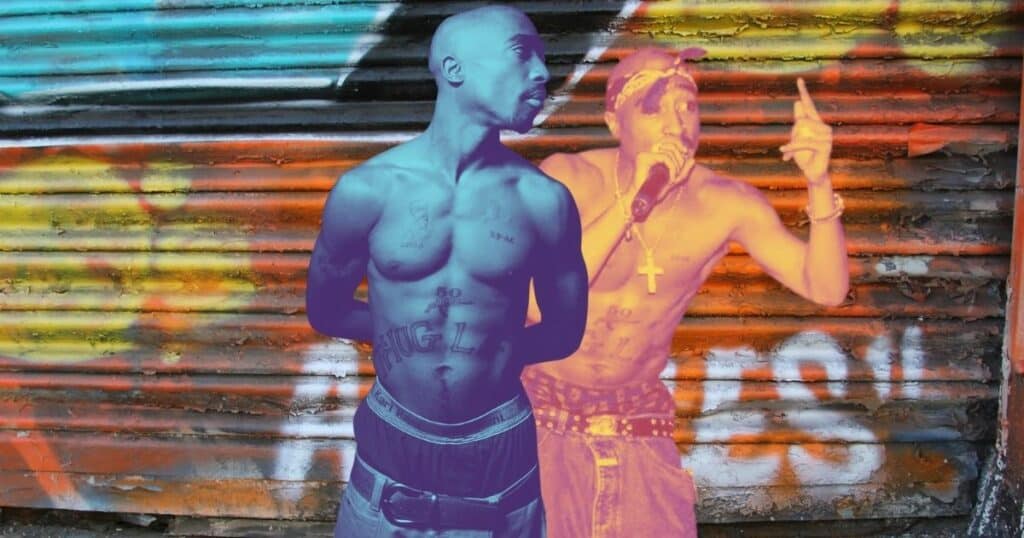Tupac Amaru Shakur, born Lesane Parish Crooks on June 16, 1971, was an American rapper and actor known by his stage names 2Pac and Makaveli. As one of the most influential and successful rappers of all time, Tupac’s distinctive style and powerful lyrics gained him a dedicated fan base that continues to thrive even after his untimely death in 1996. Born in Brooklyn, New York, his mother, Afeni Shakur, was a member of the Black Panther Party, which greatly influenced Tupac’s upbringing and social consciousness.
Throughout his career, Tupac Shakur managed to release multiple platinum-selling albums that addressed various social issues, including racism, violence, and poverty. Despite being associated with the infamous East Coast-West Coast hip-hop rivalry, Tupac’s work also showcased his emotional depth, evident in popular tracks like “Dear Mama” and “Changes.” His talent extended beyond music, with successful acting roles in movies such as “Juice” and “Poetic Justice.”
Although Tupac’s life was tragically cut short on September 13, 1996, after being fatally wounded in a drive-by shooting, his legacy continues to inspire and captivate audiences worldwide. With over 75 million albums sold to date, it is evident that Tupac Shakur’s impact on the music industry and popular culture remains undeniable.

Early Life and Background
Family and Upbringing
Tupac Shakur, born Lesane Parish Crooks, was born on June 16, 1971, in Brooklyn, New York. His mother, Afeni Shakur (born Alice Faye Williams), was a prominent member of the Black Panther Party. This revolutionary organization sought to uplift African Americans and fight against systemic inequality. His father, Billy Garland, was also part of the Black Panther Party. Tupac’s parents separated before his birth, and he was raised by his mother and had a close relationship with his stepfather, Mutulu Shakur.
Growing up in Harlem, Tupac experienced the challenges and adversity Black families living in underserved communities in the United States face. His family’s involvement with the Black Panther Party heavily influenced his life and would later come to shape his music and art.
Education and Early Artistry
Young Tupac was passionate about arts and enrolled in the Baltimore School for the Arts. While there, he studied acting, poetry, jazz, and ballet; at this school, he embraced his revolutionary spirit and developed his talent for expressing his thoughts and feelings through various creative outlets.
At the Baltimore School for the Arts, Tupac honed his skills as an aspiring rapper, actor, and poet. He made friends with fellow artists, including actress Jada Pinkett Smith, who later became a successful actress in Hollywood. Despite facing economic and social challenges, Tupac persevered and continued to push forward, ultimately establishing himself as one of his time’s most influential and groundbreaking artists.
Music Career
Rise to Fame
Tupac Shakur, known by his stage name 2Pac, began his music career in the early 1990s as a backup dancer and rapper in the hip-hop group Digital Underground. In 1991, he released his debut solo album, 2Pacalypse Now, which brought him into the spotlight and established him as a leading figure in the gangsta rap scene. The album’s provocative lyrics and social commentary attracted praise and controversy, solidifying Tupac’s prominence in California‘s West Coast hip-hop scene.
Albums and Notable Songs
Throughout his career, Tupac released five studio albums, with his most successful and acclaimed work being the 1996 double-disc album All Eyez on Me. This album, which went on to achieve multi-platinum status, includes notable tracks such as “California Love,” “2 of Amerikaz Most Wanted,” and “How Do U Want It.”
Some of his most iconic songs include:
- “Dear Mama” from the 1995 album Me Against the World, a heartfelt tribute to his mother
- “Keep Ya Head Up” from 2Pacalypse Now addresses women’s social struggle.
- “Hail Mary” from The Don Killuminati: The 7 Day Theory, released posthumously under the pseudonym Makaveli.
Collaborations and Feuds
Tupac’s career was marked by collaborations with numerous artists and groups, such as Outlawz, Snoop Dogg, and Dr. Dre. In 1995, he joined Death Row Records, led by CEO Suge Knight, further enhancing his influence on the West Coast hip-hop scene.
However, Tupac also experienced conflicts with artists and industry figures, notably The Notorious B.I.G., Puff Daddy, and other East Coast rappers. This rivalry stemmed from a broader East Coast vs. West Coast hip-hop feud and was exacerbated by Vibe Magazine’s coverage. Ultimately, this tension culminated in the tragic deaths of Tupac and The Notorious B.I.G. in separate drive-by shootings.
Tupac Shakur passed away on September 13, 1996, in Las Vegas, Nevada, leaving a lasting legacy that continues to influence artists today.
Acting Career
Filmography
Tupac Shakur began his acting career in the early 1990s. After establishing himself as a successful rapper, he expanded his artistic horizons by taking on roles in feature films. Some of his most notable film appearances include:
- Juice (1992): Tupac made his acting debut in this crime drama film, playing the role of Roland Bishop, a troubled youth involved in a robbery that ultimately leads to tragedy.
- Poetic Justice (1993): In this romantic drama movie, Tupac starred opposite Janet Jackson, portraying the character of Lucky, a postal worker and aspiring musician.
- Above the Rim (1994): In this sports drama film, Tupac played Birdie, a drug dealer with a complex relationship to the world of high school basketball.
- Gang Related (1997): Released after Tupac’s death, he starred in this crime thriller film as Detective Rodriguez, a corrupt police officer.
Memorable Performances
Throughout his acting career, Tupac garnered critical acclaim for his powerful performances, which showcased his versatility as an actor. Some of his most memorable roles include:
- In Juice, Tupac’s portrayal of Roland Bishop, a menacing and unstable character, allowed him to demonstrate his acting skills as a leading man. His performance was well-received, and the film became a cult classic.
- In Poetic Justice, Tupac’s character, Lucky, provides a softer and more vulnerable side to the rapper-turned-actor. His chemistry with co-star Janet Jackson was palpable and contributed to the film’s success.
- In Above the Rim, Tupac dove deeper into the grittier aspects of inner-city life as Birdie, showcasing his ability to portray a menacing yet nuanced character.
- Lastly, in Gang Related, Tupac’s final film role, he displayed his talent for playing an anti-hero as Detective Rodriguez, adding an extra layer of complexity to an already intricate plot.
Tupac Shakur’s acting career, though relatively short due to his untimely death in 1996, was marked by powerful performances that showcased his considerable talents beyond the realm of music. His unique presence and charisma on screen continue to resonate with audiences today, leaving a lasting legacy within the world of film.
Controversies and Legal Issues
Sexual Assault Conviction
In 1993, Tupac faced charges of sexual assault. He was convicted and sentenced to a jail term of up to 4.5 years. In 1995, Tupac was released from prison on bail after serving nine months when Death Row Records CEO Suge Knight posted his bail. Tupac maintained his innocence throughout the case, claiming the incident was consensual.
Shootings and Violence
Tupac was no stranger to violence and was often surrounded by it. His association with the gangster lifestyle and controversial lyrics contributed to his tumultuous public image. In November 1994, he was shot five times in a robbery attempt outside the Quad Recording Studio in Manhattan. Tupac accused fellow rapper, Biggie Smalls, Bad Boy Records CEO Sean “Puffy” Combs, and others of involvement in the shooting, fueling the East Coast-West Coast hip-hop rivalry.
Almost two years later, in September 1996, Tupac was shot again multiple times in a drive-by shooting in Las Vegas. He passed away six days later from his injuries. His murder remains unsolved, and numerous conspiracy theories have emerged since his death.
Incarceration
Apart from his sexual assault conviction, Tupac experienced other legal issues that led to incarceration. In 1994, he was found guilty of assaulting a film director, resulting in a 15-day jail sentence. In 1996, Tupac was arrested and convicted of probation violation stemming from a 1993 assault case where he and a friend attacked two other men and faced potential jail time.
During his time in jail, Tupac continued to make music and published a book of poetry titled “The Rose That Grew From Concrete.” His experiences with the criminal justice system inspired his songs, as seen in tracks like “Trapped,” which discusses police brutality and his feelings of being targeted by law enforcement.
Death and Aftermath
Murder Investigation
Tupac Shakur was fatally shot on September 7, 1996, in a drive-by shooting in Las Vegas, Nevada. The shooting occurred at 11:15 p.m. when the car carrying Shakur was stopped at a red light at East Flamingo Road and Koval Lane. He died six days after the incident, on September 13, 1996, at 25. The murder remains unsolved, with investigations hampered by uncooperative witnesses and minimal pursuit of gang-related leads.
Legacy
Tupac’s legacy continues to burn brightly, even decades after his death. Often referred to as one of the greatest rappers of all time, his music tackled various themes, including social issues, activism, and revolutionary ideas. Tupac’s influence extended beyond music, as he was also an actor and a poet, showcasing his multifaceted talent.
His albums have sold over 75 million copies worldwide, and in 2010, MTV ranked him as the second greatest rapper of all time. In recognition of his massive impact on the music industry, Shakur was posthumously inducted into the Rock and Roll Hall of Fame in 2017.
Commemorations
Various events and tributes have been organized to commemorate Tupac Shakur’s life and achievements. Rolling Stone has consistently ranked him among their top lists of influential music artists, highlighting his contribution to the hip-hop genre.
In addition to the Rock and Roll Hall of Fame induction, director Allen Hughes released a five-part documentary series in 2021 titled “Outlaw: The Saga of Afeni and Tupac Shakur,” exploring Tupac’s life, music, and activism from the perspective of his mother, Afeni Shakur.
Furthermore, the Tupac Amaru Shakur Foundation, started by his mother, continues to promote arts education, community involvement, and social change, keeping his spirit alive in the hearts of fans and aspiring artists alike.
Influence on Culture
Art and Activism
Tupac Shakur, also known as 2Pac and Makaveli, was more than just a rapper. He was an icon who used his platform to address social issues and bring awareness to the struggles many in inner cities face. Born in East Harlem, New York, he moved to Marin City, California, where he attended high school.
Before reaching stardom, Tupac began his career with the hip-hop group Digital Underground, featuring on their single “Same Song” and contributing to the group’s album “Sons of the P.” Eventually, he signed with Interscope Records and launched his solo career, quickly gaining a reputation for thought-provoking lyrics and powerful oration on poverty, inequality, and systemic injustice.
His commitment to activism can be traced back to his family, particularly his mother, Afeni Shakur, and his stepfather, Mutulu Shakur, both members of the Black Panther Party. Additionally, his godfather, Elmer ‘Geronimo’ Pratt, was a member of the Black Liberation Army, and his godmother, Assata Shakur, was part of the FBI’s Ten Most Wanted Fugitives list. The influence of these figures and the legacy of Túpac Amaru II, an 18th-century political leader in Peru from whom Shakur derived his name, undoubtedly shaped Tupac’s art and activism.
Posthumous Releases and Tributes
Since his tragic death in 1996 at the age of 25, Tupac’s work has significantly impacted culture and the music industry. Several posthumous albums have been released, including the diamond-certified “The Don Killuminati: The 7 Day Theory” under his alias Makaveli. The album, completed shortly before his death, is a testament to his artistic prowess and dedication to his craft.
The 2003 documentary “Tupac: Resurrection” provided essential insights into Tupac’s life and career. In 2012, a hologram version of Tupac performed at the Coachella Music Festival, showcasing advancements in science and technology and solidifying his ongoing influence in the entertainment world.
His music continues to inspire and be celebrated by artists and fans alike. In 2017, his induction into the Rock and Roll Hall of Fame helped solidify his legacy as a groundbreaking artist. Additionally, tributes to his life and work can be found in various forms, from mentions in popular songs to artwork and murals, on the Hollywood Walk of Fame, and at the Apollo Theater in Harlem, New York.
Impact on the Music Industry and Society
Tupac’s impact on culture extends beyond his music and activism. He was also an accomplished actor, making his debut in the 1991 film “Nothing But Trouble” before going on to star in “Juice,” “Poetic Justice,” and other films. His acting abilities showcased the depth of his talent and introduced him to a wider audience.
Some of Tupac’s most iconic songs, such as “Keep Ya Head Up,” continue to significantly impact society by addressing issues such as misogyny, racial discrimination, and self-respect. His lyrics and messages have transcended time, resonating with new generations who continue to confront these issues.
Tupac Shakur’s influence on culture is undeniable, from his activism and artistry to his posthumous releases and the tributes that continue to be made in his honor. His life and work remain a powerful reminder of the critical role that artists can play in addressing urgent social issues and inspiring change.
Frequently Asked Questions
When did Tupac’s first album release?
Tupac’s first album, “2Pacalypse Now,” was released on November 12, 1991. The album contained tracks highlighting social issues and injustices, marking the beginning of his influential career in the rap industry.
What would Tupac’s age be now?
Tupac Shakur was born on June 16, 1971. If he were still alive today, Tupac would be 52 years old as of June 13, 2023.
How many times was he shot in NY?
Tupac was shot five times in New York City on November 30, 1994, at Quad Recording Studios. This incident fueled the existing East Coast-West Coast hip-hop rivalry and further escalated tensions between Tupac and other rap artists.
Does 2Pac have a Walk of Fame star?
Tupac Shakur does not have a star on the Hollywood Walk of Fame. Despite his significant contributions to music and film, he has not yet been awarded this recognition.
Who killed Tupac?
Tupac Shakur was fatally shot in Las Vegas, Nevada, on September 13, 1996. His murder remains unsolved, and the identity of his killer is still unknown. Various theories and speculations surround his death, but no one has been officially charged or convicted in the case.
What is Tupac’s best-selling album?
Tupac’s best-selling album is “All Eyez on Me,” released on February 13, 1996. This double-disc album features hit singles like “California Love” and “How Do U Want It” and has been certified Diamond, selling over 10 million copies in the United States.


